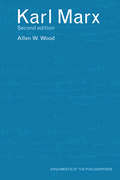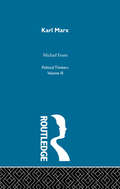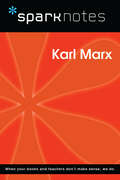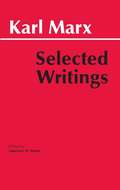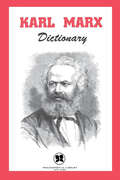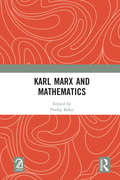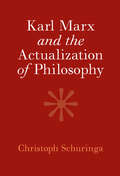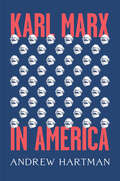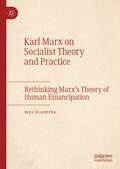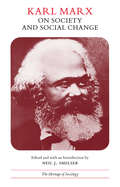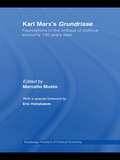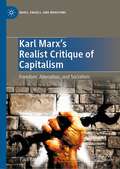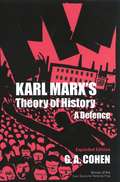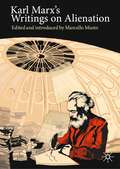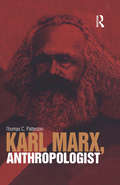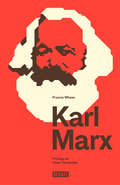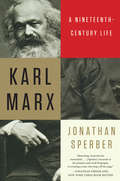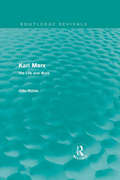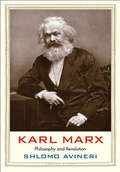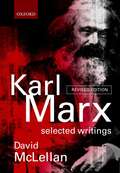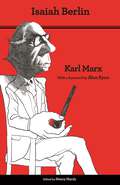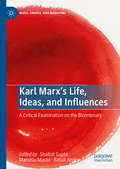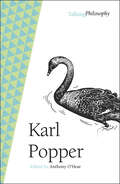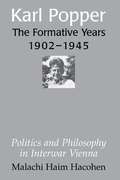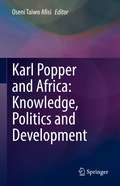- Table View
- List View
Karl Marx (Arguments of the Philosophers)
by Wood AllenThis is one of the most respected books on Marx's philosophical thought. Wood explains Marx's views from a philosophical standpoint and defends Marx against common misunderstandings and criticisms of his views. All the major philosophical topics in Marx's work are considered: the central concept of alienation; historical materialism and Marx's account of social classes; the nature and social function of morality; philosophical materialism and Marx's atheism; and Marx's use of the Hegelian dialectical method and the Marxian theory of value.The second edition has been revised to include a new chapter on capitalist exploitation and new suggestions for further reading. Wood has also added a substantial new preface which looks at Marx's thought in light of the fall of the Soviet Union and our continued ambivalence towards capitalism, exploring Marx's continuing relevance in the twenty-first century.
Karl Marx (Political Thinkers Ser. #No. 3)
by Michael EvansFirst published in 1975, this book provides an interpretative introduction to the political thought of Karl Marx. The approach is both historical and analytical, with emphasis placed on developments and changes in Marx's thought. The book is firmly based on a close reading of primary sources including recently discovered documents on the Communist League, the drafts of Marx's Civil War in France and the Grundrisse manuscripts.
Karl Marx (SparkNotes Philosophy Guide)
by SparkNotesKarl Marx (SparkNotes Philosophy Guide) Making the reading experience fun! SparkNotes Philosophy Guides are one-stop guides to the great works of philosophy–masterpieces that stand at the foundations of Western thought. Inside each Philosophy Guide you&’ll find insightful overviews of great philosophical works of the Western world.
Karl Marx - Selected Writings
by Karl Marx Lawrence H. SimonFeaturing the most important and enduring works from Marx's enormous corpus, this collection ranges from the Hegelian idealism of his youth to the mature socialism of his later works. Organized both topically and in rough chronological order, the selections (many of them in the translations of Loyd D. Easton and Kurt H. Guddat) include writings on historical materialism, excerpts from Capital, and political works.
Karl Marx Dictionary
by Morris StockhammerThis accessible and comprehensive reference volume covers the concepts, terminology, and writings of the towering political philosopher. The detailed, authoritative entries of this volume, written in clearly understandable terms, extract the essential ideas from Karl Marx&’s voluminous and historically important works. As the three volumes of Das Kapital are the main source of Marxist thought, every significant passage from this masterwork is isolated for reference and scrutiny. In addition, many other sources from the vast body of Marx&’s writings are closely examined. With its expertly researched, in-depth entries, this volume presents a complete account of Marx&’s philosophy.
Karl Marx and Mathematics
by Pradip BaksiThis collection of various texts on Karl Marx and Mathematics is the revised and extended second edition of the Special Supplement to Karl Marx, Mathematical Manuscripts (1994; Calcutta: Viswakos) titled Marx and Mathematics. The sources of the texts included in the three parts of this collection and, some biographical information about their respective authors have been indicated at the end of each text. The emergence and development of the Ethnomathematics movement continue to change our understanding of the history of evolution of plural mathematics on planet earth since the Neolithic age. Rediscovery and study of some of the neglected source texts have further energized investigations on the subsequent history of mathematical cultures, including those on the histories of algebra and analysis in some of the ancient and medieval languages of Asia, like Sanskrit, Arabic and Malayalam. Consequently, it is now possible to indicate some of the larger gaps in the dominant understanding of history of mathematics not only in Marx’s time, but also at the time of editing Marx’s mathematical manuscripts in the twentieth century, and even today. Finally, the emergence and development of mathematical and statistical software packages are vigorously reshaping our ways of conceptualizing and doing mathematics towards an unknown future. It is time now for taking yet another look at all mathematical text from the past and that includes the mathematical manuscripts of Marx. These texts have been divided into three parts. Part one contains some topical texts related to the history of emergence, development, editing, publication and reception of the mathematical manuscripts of Karl Marx. Part two contains a selection of five articles reflecting some of the investigations inspired by these manuscripts in Russia, India and France. Part three contains five articles on plural mathematics before and after Karl Marx (1818-1883). The texts in this collection are followed by two appendices containing two bibliographies: one on Hegel and mathematics and, the other on mathematics and semiotics. Please note: This title is co-published with Aakar Books, Bew Delhi. Taylor & Francis does not sell or distribute the print edition in South Asia (India, Sri Lanka, Nepal, Bangladesh, Pakistan, Maldives or Bhutan).
Karl Marx and the Actualization of Philosophy
by Christoph SchuringaIt is indisputable that Marx began his intellectual trajectory as a philosopher, but it is often thought that he subsequently turned away from philosophy. In this book, Christoph Schuringa proposes a radically different reading of Marx's intellectual project and demonstrates that from his earliest writings his aim was the 'actualization' of philosophy. Marx, he argues, should be understood not as turning away from philosophy, but as seeking to make philosophy a practical force in the world. By analysing a series of texts from across Marx's output, Schuringa shows that Marx progressively overcame what he called 'self-sufficient philosophy', not in order to leave philosophy behind but to bring it into its own. This involves a major reinterpretation of Marx's relationship to his ancestors Aristotle, Kant and Hegel, and shows that philosophy, as it actualizes itself, far from being merely a body of philosophical doctrine, figures as an instrument of the revolution.
Karl Marx in America
by Andrew HartmanThe vital and untold story of Karl Marx’s stamp on American life. To read Karl Marx is to contemplate a world created by capitalism. People have long viewed the United States as the quintessential anti-Marxist nation, but Marx’s ideas have inspired a wide range of people to formulate a more precise sense of the stakes of the American project. Historians have highlighted the imprint made on the United States by Enlightenment thinkers such as Adam Smith, John Locke, and Thomas Paine, but Marx is rarely considered alongside these figures. Yet his ideas are the most relevant today because of capitalism’s centrality to American life. In Karl Marx in America, historian Andrew Hartman argues that even though Karl Marx never visited America, the country has been infused, shaped, and transformed by him. Since the beginning of the Civil War, Marx has been a specter in the American machine. During the Gilded Age, socialists read Marx as an antidote to the unchecked power of corporations. In the Great Depression, communists turned to Marx in hopes of transcending the destructive capitalist economy. The young activists of the 1960s were inspired by Marx as they gathered to protest an overseas war. Marx’s influence today is evident, too, as Americans have become increasingly attuned to issues of inequality, labor, and power. After decades of being pushed to the far-left corner of intellectual thought, Marx’s ideologies have crossed over into the mainstream and are more alive than ever. Working-class consciousness is on the rise, and, as Marx argued, the future of a capitalist society rests in the hands of the people who work at the point of production. A valuable resource for anyone interested in Marx’s influence on American political discourse, Karl Marx in America is a thought-provoking account of the past, present, and future of his philosophies in American society.
Karl Marx on Socialist Theory and Practice: Rethinking Marx’s Theory of Human Emancipation
by Wei XiaopingThis book discusses Marx’s thinking on human emancipation based on his critique of capitalism and the prospect of socialism. It analyzes the double relations between persons and things, and persons and persons by tracking Marx’s writings, including MEGA2, and taking into consideration the socialist practice and socialist reform of the last century. It is a necessary study for social scientists, social andpolitical philosophers, and students for its deep and wide analysis from the perspective of Marxian theory in practice.
Karl Marx on Society and Social Change (The Heritage of Sociology)
by Karl MarxThis volume presents those writings of Marx that best reveal his contribution to sociology, particularly to the theory of society and social change. The editor, Neil J. Smelser, has divided these selections into three topical sections and has also included works by Friedrich Engels. The first section, "The Structure of Society," contains Marx's writings on the material basis of classes, the basis of the state, and the basis of the family. Among the writings included in this section are Marx's well-known summary from the Preface of A Contribution to a Critique of Political Economy and his equally famous observations on the functional significance of religion in relation to politics. The second section is titled "The Sweep of Historical Change." The first selection here contains Marx's first statement of the main precapitalist forms of production. The second selection focuses on capitalism, its contradictions, and its impending destruction. Two brief final selections treat the nature of communism, particularly its freedom from the kinds of contradictions that have plagued all earlier forms of societies. The last section, "The Mechanisms of Change," reproduces several parts of Marx's analysis of the mechanisms by which contradictions develop in capitalism and generate group conflicts. Included is an analysis of competition and its effects on the various classes, a discussion of economic crises and their effects on workers, and Marx's presentation of the historical specifics of the class struggle. In his comprehensive Introduction to the selections, Professor Smelser provides a biography of Marx, indentifies the various intellectual traditions which formed the background for Marx's writings, and discusses the selections which follow. The editor describes Marx's conception of society as a social system, the differences between functionalism and Marx's theories, and the dynamics of economic and political change as analyzed by Marx.
Karl Marx's Grundrisse: Foundations of the critique of political economy 150 years later (Routledge Frontiers Of Political Economy Ser.)
by Marcello MustoWritten between 1857 and 1858, the Grundrisse is the first draft of Marx‘s critique of political economy and, thus, also the initial preparatory work on Capital. Despite its editorial vicissitudes and late publication, Grundrisse contains numerous reflections on matters that Marx did not develop elsewhere in his oeuvre and is therefore extremely im
Karl Marx's Realist Critique of Capitalism: Freedom, Alienation, and Socialism (Marx, Engels, and Marxisms)
by Paul RaekstadThis book offers the first realist reconstruction of Marx’s critique of capitalism. Reading Marx through a realist lens enables us to make sense of the connections between (1) Marx’s positive concept of freedom, rooted in a theory of human development, (2) his understanding of alienation as diagnosing capitalist unfreedom, and (3) his conceptions of democracy and socialism, respectively, as the cures for this unfreedom. Along the way, it discusses and responds to some of Marx’s most insightful critics, such as Max Weber and Friedrich Hayek. This clarifies Marx’s ideas for a new generation of political thinkers; explains the challenge they pose to contemporary debates about freedom, democracy, and future economic institutions; and demonstrates that these ideas remain both defensible and compelling.
Karl Marx's Theory of History: A Defence
by G. A. CohenFirst published in 1978, this book rapidly established itself as a classic of modern Marxism. Cohen's masterful application of advanced philosophical techniques in an uncompromising defense of historical materialism commanded widespread admiration. In the ensuing twenty years, the book has served as a flagship of a powerful intellectual movement--analytical Marxism. In this expanded edition, Cohen offers his own account of the history, and the further promise, of analytical Marxism. He also expresses reservations about traditional historical materialism, in the light of which he reconstructs the theory, and he studies the implications for historical materialism of the demise of the Soviet Union.
Karl Marx's Writings on Alienation (Marx, Engels, and Marxisms)
by Marcello MustoThe theory of alienation occupies a significant place in the work of Marx and has long been considered one of his main contributions to the critique of bourgeois society. Many authors who have written on this concept over the 20th century have erroneously based their interpretations on Marx’s early writings. In this anthology, by contrast, Marcello Musto has concentrated his selection on the most relevant pages of Marx’s later economic works, in which his thoughts on alienation were far more extensive and detailed than those of the early philosophical manuscripts. Additionally, the writings collated in this volume are unique in their presentation of not only Marx’s critique of capitalism, but also his description of communist society. This comprehensive rediscovery of Marx’s ideas on alienation provides an indispensable critical tool for both understanding the past and the critique of contemporary society.
Karl Marx, Anthropologist
by Thomas C. PattersonAfter being widely rejected in the late 20th century the work of Karl Marx is now being reassessed by many theorists and activists. Karl Marx, Anthropologist explores how this most influential of modern thinkers is still highly relevant for Anthropology today. Marx was profoundly influenced by critical Enlightenment thought. He believed that humans were social individuals that simultaneously satisfied and forged their needs in the contexts of historically particular social relations and created cultures. Marx continually refined the empirical, philosophical, and practical dimensions of his anthropology throughout his lifetime.Assessing key concepts, from the differences between class-based and classless societies to the roles of exploitation, alienation and domination in the making of social individuals, Karl Marx, Anthropologist is an essential guide to Marx's anthropological thought for the 21st century.
Karl Marx: A Life
by Francis WheenIn this first comprehensive biography of Marx since the end of the Cold War, Wheen delivers not a socialist ogre but a fascinating, ultimately humane man, while still examining the criticisms of his detractors. of photos.
Karl Marx: A Nineteenth-century Life
by Jonathan Sperber"Absorbing, meticulously researched. . . . [Sperber] succeeds in the primary task of all biography, re-creating a man who leaps off the page." --Jonathan Freedland, New York Times Book Review In this magisterial biography of Karl Marx, "likely to be definitive for many years to come" (John Gray, New York Review of Books), historian Jonathan Sperber creates a meticulously researched and multilayered portrait of both the man and the revolutionary times in which he lived. Based on unprecedented access to the recently opened archives of Marx's and Engels's complete writings, Karl Marx: A Nineteenth-Century Life provides a historical context for the personal story of one of the most influential and controversial political philosophers in Western history. By removing Marx from the ideological conflicts of the twentieth century that colored his legacy and placing him within "the society and intellectual currents of the nineteenth century" (Ian Kershaw), Sperber is able to present a full portrait of Marx as neither a soothsaying prophet of the modern world nor the author of its darkest atrocities. This major biography fundamentally reshapes our understanding of a towering historical figure.
Karl Marx: His Life and Work (Routledge Revivals)
by Otto RühleFirst published in English in 1929, this is a reissue of Otto Rühle's comprehensive biography of Karl Marx. Written by a leading Marxist and key figure within the German Labour movement, this is an exceptionally detailed and well-researched study which sets Marx's life and work firmly within its social and historical context before examining in depth the major events of his life and the writings for which he has become such an influential figure in modern political philosophy. The final chapter offers an appraisal of both the man and his work, as Rühle summarises why he believes Marx was a genius.
Karl Marx: Philosophy and Revolution (Jewish Lives)
by Shlomo AvineriThis new exploration of Marx as a Jewish thinker presents “a perceptive and fair-minded corrective to superficial treatments” of his life and work (Jonathan Rose, Wall Street Journal).A philosopher, historian, sociologist, economist, current affairs journalist, and editor, Karl Marx was one of the most influential and revolutionary thinkers of modern history. But he is rarely thought of as a Jewish thinker, and his Jewish background is either overlooked or misrepresented. Here, distinguished scholar Shlomo Avineri argues that Marx’s Jewish origins made a significant impression on his work. Marx was born in Trier, then part of Prussia, and his family had enjoyed full emancipation under earlier French control of the area. But then its annexation to Prussia deprived the Jewish population of its equal rights. These developments led to the reluctant conversion of Marx’s father, and similar tribulations radicalized many other Jewish intellectuals of that time.Avineri puts Marx’s Jewish background in its proper and balanced perspective, and traces Marx’s intellectual development in light of the historical, intellectual, and political contexts in which he lived.
Karl Marx: Selected Writings
by Karl Marx David McLellanThis second edition of McLellan's comprehensive selection of Marx's writings includes carefully selected extracts from the whole range of Marx's political, philosophical, and economic thought. Each section of the book deals with a different period of Marx's life, allowing readers to trace the development of his thought from his early years as a student and political journalist in Germany up through the final letters he wrote in the early 1880s. A fully updated editorial introduction and bibliography has been included for each extract in this new edition.
Karl Marx: Thoroughly Revised Fifth Edition
by Isaiah BerlinIsaiah Berlin's intellectual biography of Karl Marx has long been recognized as one of the best concise accounts of the life and thought of the man who had, in Berlin's words, a more "direct, deliberate, and powerful" influence on mankind than any other nineteenth-century thinker. A brilliantly lucid work of synthesis and exposition, the book introduces Marx's ideas and sets them in their context, explains why they were revolutionary in political and intellectual terms, and paints a memorable portrait of Marx's dramatic life and outsized personality. Berlin takes readers through Marx's years of adolescent rebellion and post-university communist agitation, the personal high point of the 1848 revolutions, and his later years of exile, political frustration, and intellectual effort. Critical yet sympathetic, Berlin's account illuminates a life without reproducing a legend. New features of this thoroughly revised edition include references for Berlin's quotations and allusions, Terrell Carver's assessment of the distinctiveness of Berlin's book, and a revised guide to further reading.
Karl Marx’s Life, Ideas, and Influences: A Critical Examination on the Bicentenary (Marx, Engels, and Marxisms)
by Marcello Musto Shaibal Gupta Babak AminiSince the latest crisis of capitalism broke out in 2008, Marx has been back in fashion, and sometimes it seems that his ideas have never been as topical, or as commanding of respect and interest, as they are today. This edited collection arises from one of the largest international conferences dedicated to the bicentenary of Marx’s birth. The volume contains 16 chapters authored by globally renowned scholars and is divided into two parts: I) On the Critique of Politics; II) On the Critique of Political Economy. These contributions, from multiple academic disciplines, offer diverse perspectives on why Marx is still so relevant for our times and make this book a source of great appeal for both expert scholars of Marx as well as students and general readers who are approaching his theories for the first time.
Karl Popper (Talking Philosophy)
by Anthony O’HearSir Karl Popper was a major thinker of the twentieth century, one who – as Anthony O'Hear writes in his new Foreword – 'has had a beneficent influence on those who have come under the spell of his thought and of the inimitable prose in which he articulates it'. It is now twenty-five years since Popper died, and thus seems – after a quarter of a century – an apposite moment to revaluate his impact, significance, and influence. The several chapters in this classic volume focus on many key elements of Popper's thought and philosophy. They are by no means uncritical, but afford Popper the respect due to a philosopher who wrote always with a degree of clarity, precision, and directness rare in the academic world of his time, and – as O'Hear puts it – 'even rarer subsequently'. This important book constitutes an essential introduction to some of the most esteemed philosophical writing of our times.
Karl Popper - The Formative Years, 1902-1945 Politics and Philosophy in Interwar Vienna
by Malachi Haim HacohenThis intellectual biography recovers the legacy of Karl Popper (1902-1994), the progressive, cosmopolitan, Viennese socialist who combated fascism, revolutionized the philosophy of science, and envisioned the Open Society.
Karl Popper and Africa: Knowledge, Politics and Development
by Oseni Taiwo AfisiThis book provides a diverse contextualization of Popper’s critical rationalism concerning knowledge and his generalized attitude of criticism on appropriate social and political reforms in contemporary Africa. The book evaluates how best to address contemporary political problems, especially in politically very troubled parts of the world. To address these contemporary problems, especially as it relates to Africa, the authors found the political philosophy of Popper as suitable. The discussion of Popper’s political philosophy engages us directly with all the particularities of socio-economic and political problems within contemporary Africa. In other words, it presents the truth of the present socio-political reality in Africa where the question of what kinds of political ideas and concepts can be offered as appropriate to a political environment, which so greatly faces facets of developmental issues. Although the issues and events that informed the writings of Popper’s The Poverty of Historicism as well as The Open Society and Its Enemies, were among others, the rise of fascism and communism in Europe, the inventiveness of this work is how happily scholars in non-liberal societies, such as in Africa, can pick up Popper’s insights and usefully work with them to offer appropriate social reforms for their society. This volume is a critical juxtaposition of Popper’s ideas in a bid to make good sense of social and intellectual conditions in Africa, particularly as it relates to the scale and speed of social change that is needed in most African nations that are often ridden by corruption. The book is suitable for studies in political philosophy, economic and development studies, African Studies and Indigenous Knowledge systems.
